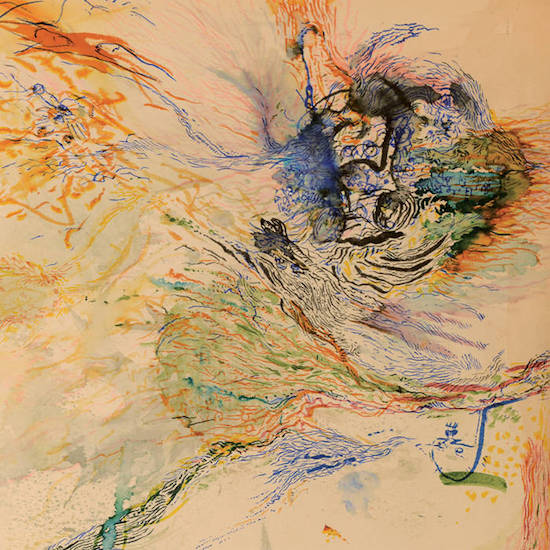Hubert Zemler and Piotr Bukowski have been associated with Warsaw’s experimental music scene for two decades. The former plays solo (I wrote about his <a
href=”https://thequietus.com/articles/31043-vtss-trupa-trupa-wojciech-rusin-resina-review” target=”out”>DRUT album in tQ) and collaborated with Evan Ziporyn, Gyan Riley, John Tilbury, and Agusti Fernandez, among others. He also creates electronic music as Melatony or in CEL with Felix Kubin. More than a decade ago, the other formed the band Stwory, then Xenony, and most recently, the Afropunk and psychedelic Javva; his <a
href=”https://milieulacphale.bandcamp.com/album/partes-ma35” target=”out”>solo recordings remind Eric Chenaux and John Kolodij.
They established Opla due to an interest in Polish folk music, which for many decades was treated as something unleavened rather than creative and inspiring – projects such as Muzyka Zakorzeniona (‘rooted music’ in English), among others, have changed that. On their 2019 album Obertasy, released by Instant Classic sublabel Ersatz Recordings, Opla translated the traditional Polish folk-dance music ‘oberki’ to rock instruments. They had in mind the idea and spirit of primitive playing of the triple metres characteristic for these dances on guitar and drums rather than reinterpreting specific motifs. An extension of these ideas was OST, recorded two years ago – illustrative music to a text read by the writer Andrzej Stasiuk with the saxophonist Mikołaj Trzaska.
On GTI, released by Pointless Geometry, they’re coming back with similar ideas but switching drums to electronic pads and adding a bunch of effects to the guitar. While Bukowski reminded me of Bill Orcutt on the first album, now his looped patterns recall Tyondai Braxton or Dustin Wong, and sometimes the more improvised, bluesy style of Daniel Bachmann or Andy Moor’s playing on the beautiful Pavilion with Yannis Kyriakides. Zemler gently builds up a percussive background not necessarily dominated by rhythm. Sometimes he layers uneven and soft-sounding beats; other times, his drum parts are very much synthesized, spinning quasi-footwork variations close to his achievements on the <a
href=”https://outlineslabel.bandcamp.com/album/glu-river” target=”out”>Groove 8 album.
They recorded GTI in one take, which allowed them to retain the freedom and intuitive development of compositions. As a result, this album is much more subdued and intimate than the debut, producing a less dynamic sound. Bukowski introduces swirling motifs, widening his instrument’s sound palette. When he loops the guitar in the background, you can hear bluesy solos in the foreground, accompanied by Zemler’s edgy yet muffled percussion (‘YPN’). The duo brilliantly builds space, too – ‘AWD’ sounds very desolate, unfolding from the swishy thickening phrases of electronics and loops, while ‘BAT’ comes across as a somewhat blurred impression, boosted by a nervously pulsating beat.
This album expands their search for an identity at the intersection of folk and contemporary sounds. The triple metres played on the pads are less danceable, but it’s not difficult to hear the syncopations, all the more hypnotic in contrast to the guitar phrases looped in a manner characteristic of ‘oberki’. The electronic production strips the band of its rawness, although there is a palpable undercurrent of primitivism. On GTI, instead of music sounding like it’s being played by musicians out of their minds and without restraint; the duo instead find space for lyricism and poetry.


